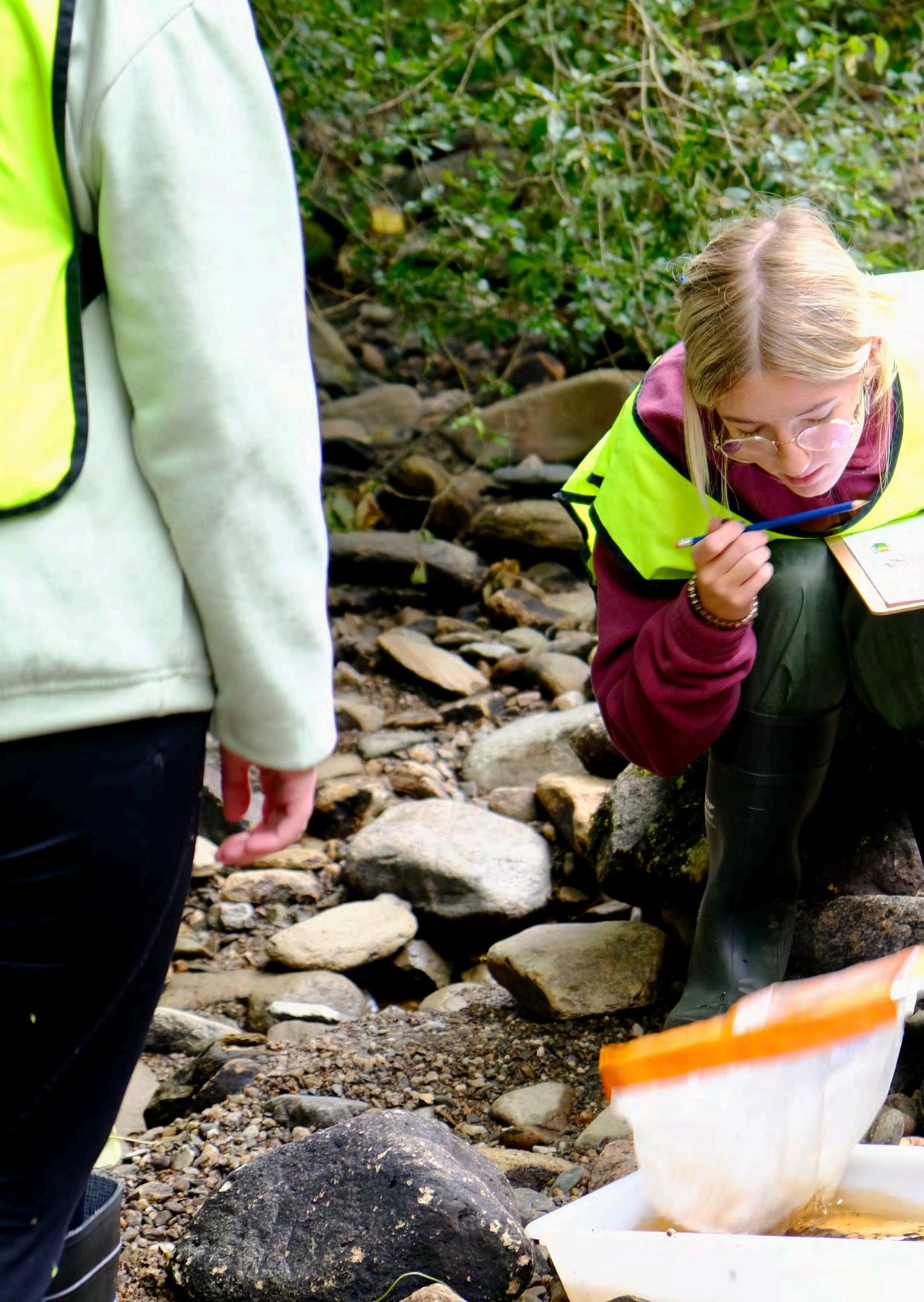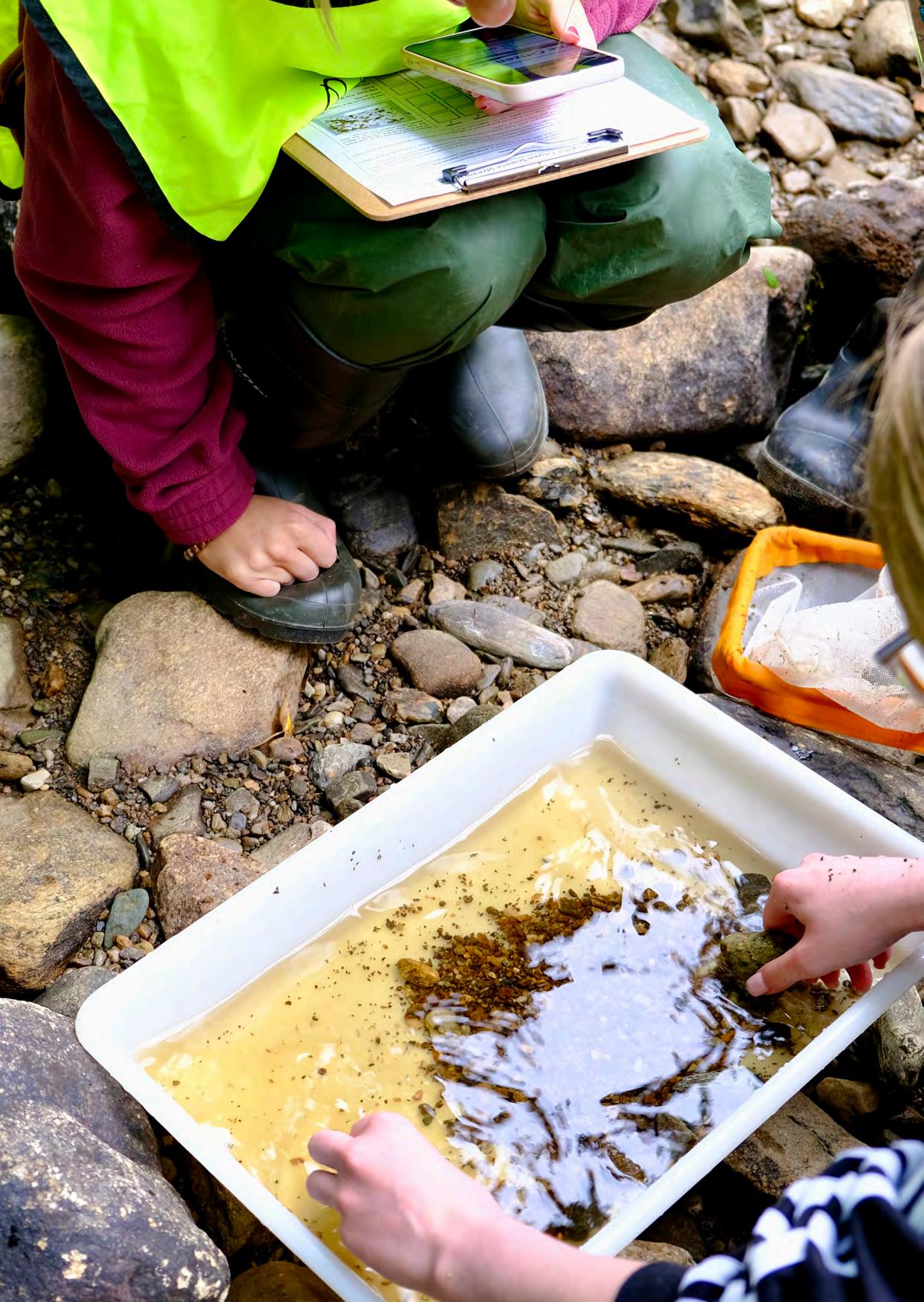

Loughs Agency Environmental Education Offering
Science of Water
(Freshwater Invertebrates)
Outline
The Science of Water programme explores biodiversity in freshwater environments such as rivers, lakes, and ponds. Participating groups will learn about the importance of maintaining and restoring biodiversity in their local ecosystems, and how a resilient ecosystem contains a rich variety of living organisms—whereas low biodiversity is often a sign of environmental damage. Topics including climate change, pollution, and sustainability are integrated into the session.
Activities
• Image-rich presentation featuring Loughs Agency role & science work
• Live freshwater invertebrate sampling and hands-on identification
• Compare healthy vs. polluted river samples, linking biodiversity to water quality
Key Learning
• Understand the role of Loughs Agency in conservation & protection
• Identify freshwater invertebrates
• Connect water quality and biodiversity to environmental health
• Understand links between salmon, invertebrate life, and food webs
• Recognise invertebrates as indicator species and salmon as the ultimate indicator species
• Roleplay as freshwater scientists
• Understand the connection between environmental and human health
• Discuss human activities that lower water quality
Suitable for: KS2 & KS3 | Adaptable for KS1

Science of Salmon
(Salmonid Lifecycles)
Outline
Science of Salmon focuses on the life cycle of the North Atlantic salmon. Loughs Agency monitors and researches salmon at every stage of their life cycle to ensure their protection. Salmon are considered both a keystone and umbrella species—their presence is a strong indicator of ecological health. Topics including climate change, pollution, and sustainability are integrated into the session.
Students will explore each life stage of salmon, the threats they face (both natural and human-made), migration patterns and how Loughs Agency protects them using tools like Acoustic Telemetry and monitoring.
Activities
• Image-rich presentation featuring Loughs Agency role & science work
• Interactive storytelling of the salmon life cycle
• Drama-based roleplay of life stages
• Art project or dissection demonstration (subject to availability)
Key Learning
• Understand the role of Loughs Agency in conservation & protection
• Understand that all living things have a life cycle
• Recognise that life cycles vary in length
• List salmon life cycle stages in order
• Use scientific vocabulary about salmon and their life cycle
• Understand salmon migration as part of their life cycle
• Recognise birth, growth, reproduction, and death as common to all organisms
• Appreciate the natural environment’s value to humans and wildlife
• Understand that salmon live in different environments throughout life
• Know that salmon are anadromous (migrate between freshwater and saltwater)
• Recognise salmon’s vital role in food chains and ecosystems
• Explain why animals migrate
• Name two other local migratory animals (excluding salmon)
Bonus Learning
• Understand preservation and conservation
• Understand the importance of protecting wild places and wildlife
• Grasp the concept of sustainability
• Recognise our dependence on natural systems
• Understand the link between environmental and human health
Suitable for: KS2 & KS3 | Adaptable for KS1
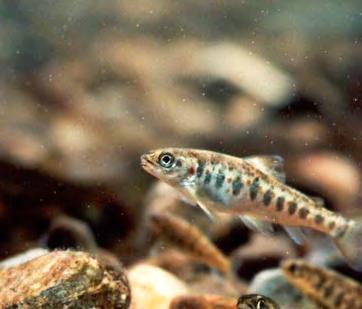
Anatomy of a River
(River Processes)
Outline
Anatomy of a River explores physical river processes and connects them to the ecology of salmonids. The workshop examines the geography of the Foyle and Carlingford river systems, including their main tributaries, and highlights how erosion, transportation, and deposition shape rivers.
Students explore how these processes affect salmon habitats and examine both natural and human-made threats. A case study on habitat restoration work by Loughs Agency illustrates these challenges and solutions. Topics including climate change, pollution, and sustainability are integrated into the session.
Activities
• Image-rich presentation featuring Loughs Agency role & science work
• River Model Experiment: Demonstrate and replicate fluvial processes using a working river model
• Mapping Activity: Use printed catchment maps to colour rivers and identify key landmarks
• Sor ting Activity: Match laminated river feature images with names and complete an anatomy diagram
• River Field Trip: Conduct habitat and river surveys at a local river site (subject to weather and safety).
Key Learning
Key Stage 2
• Understand the role of Loughs Agency in conservation & protection
• Understand how rivers are formed
• Recognise how river features and landscapes change from source to mouth
• Understand erosion as the removal of rock and soil by water, ice, or wind
• Identify upper, middle, and lower river courses
• Identify common features in each river course
Key Stage 3
• Understand the role of Loughs Agency in conservation & protection
• Define erosion and understand its causes
• Learn the four processes of erosion and transportation
• Differentiate between vertical and lateral erosion
• Understand how these processes change along a river’s profile
Field Trip Objectives
• Understand the importance of careful observation in fieldwork
• Identify river features (bed type, flow, land use, and structures)
• Assess river health using invertebrate sampling and biotic index analysis
• Understand biodiversity as a measure of ecosystem health
• Identify tools used in habitat studies
• Recognise the role of environmental scientists in habitat protection
Suitable for: KS2 & KS3
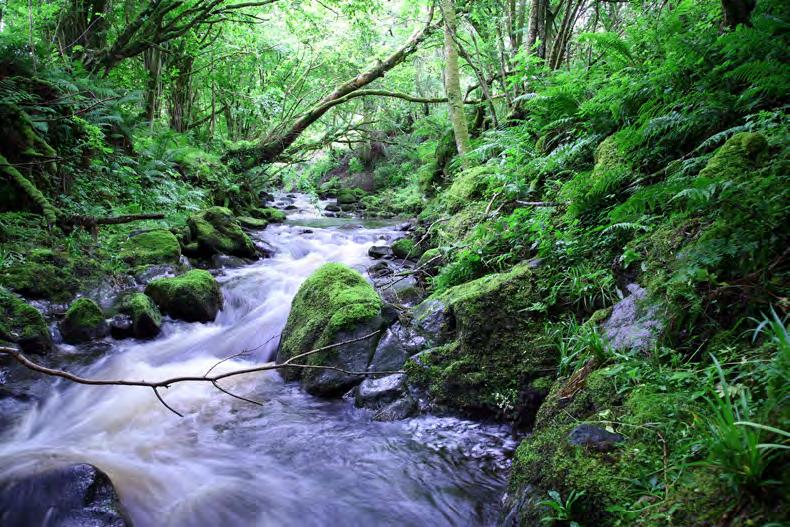
Ocean Literacy & Marine Biodiversity
Outline
This Ocean Literacy & Marine Biodiversity workshop explores local marine and the importance of ocean conservation. It highlights Loughs Agency’s marine work, including Acoustic Telemetry and surveys of Atlantic salmon and native flat oysters. Topics including climate change, pollution, and sustainability are integrated into the session.
Students will be introduced to the Seven Principles of Ocean Literacy, which explain the ocean’s role in supporting life on Earth and encourage care for our local marine ecosystems and the services they provide.
Activities
• Image-rich presentation featuring Loughs Agency role & science work
• Exploration of the Seven Principles of Ocean Literacy
• Marine biodiversity “show & tell”
• Compare sizes of local marine species
• Understand marine litter and its decomposition rates
• Explore marine food webs
Learning Objectives
• Understand the role of Loughs Agency in conservation & protection
• Understand how ocean health affects all life on Earth
• Learn and apply the Seven Principles of Ocean Literacy
• Identify local marine species and their ecological roles
• Recognise Atlantic Salmon and Native Flat Oysters as indicator and umbrella species
• Discuss human impacts and conservation strategies
• Learn how to track marine life through Acoustic Telemetry
• Understand the impact of climate change on the marine environment
Suitable for: KS2 & KS3 | Adaptable for KS1


Field Trips & Outdoor Learning
Outline
All of our environmental education programmes can be enhanced with optional field trips to local rivers, wetlands, or coastal areas. These trips provide a powerful opportunity for pupils to engage with nature, apply classroom knowledge in a real-world setting, and develop environmental awareness through hands-on experience.
Why Field Learning Matters:
• Connects theory to reality — students see ecosystems, invertebrates, fish habitats, and river/coastal features up close
• Encourages observation, data collection, and critical thinking
• Builds personal connection to local biodiversity and the importance of protecting it
• Supports wellbeing, confidence, and teamwork through outdoor exploration
Field Trip Format:
• Adaptable to all workshops (Science of Water, Science of Salmon, River Anatomy, Ocean Literacy)
• Led by Loughs Agency environmental education officers
• Activities may include:
• Freshwater & Marine life sampling
• Habitat surveys
• River/Coastal feature identification
• Water quality testing
• River/Coastal biodiversity walks
• Litterpicks
Accessibility:
• All activities are fully adaptable to suit group needs, including age, ability, and mobility.
• Sites are selected in close proximity to schools where possible.
• Transport arrangements are required from participating schools/groups.
• We work with schools to ensure safety, accessibility, and meaningful engagement.
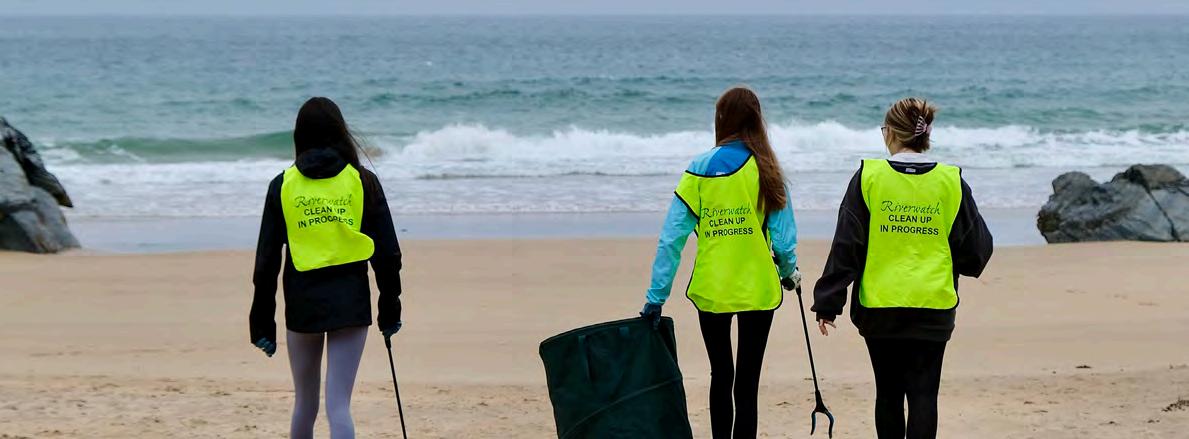

How to Book a Workshop
We offer flexible scheduling for schools and community groups. Workshops can be delivered in classrooms, outdoor environments, or at Loughs Agency (Derry~Londonderry/Carlingford).
Conclusion
Loughs Agency’s education programmes offer hands-on, interactive learning experiences designed to inspire the next generation of environmental stewards. By engaging with our workshops, students gain a deeper understanding of their local environment, the importance of conservation, and the ways they can make a difference.

Key Stage 1 & 2 (Primary)
Area of Learning: The World Around Us
Interdependence
• Understand the relationships between animals, plants, and people in ecosystems
• Explore how changes in the environment affect living things
• Understand the importance of conservation and sustainability
Place
• Study local rivers and marine environments, including how they are used and protected
• Compare features of rivers and seas (physical geography)
Change Over Time
• Explore life cycles (e.g., salmon) and understand seasonal/environmental change
• Recognise the impact of humans on ecosystems
Movement and Energy
• Study the water cycle, river processes, and flow dynamics through models and experiments, ocean circulation
Cross-Curricular Skills:
• Using Mathematics (measuring, estimating, data recording in field trips)
• Using ICT (mapping activities, presentations)
• Communication (discussions, role-play, writing up field observations)

Key Stage 1 & 2 (Primary)
Area of Learning: Science
Biology:
• Study of organisms and their environment
• Adaptations, life cycles, food webs, and biodiversity
• Human impact on ecosystems and conservation strategies
Environmental Biology & Ecology Topics:
• Ecosystem health and indicators (e.g., invertebrates, salmon)
• Sampling methods and environmental data collection
Area of Learning: Geography
Physical Geography:
• River formation, erosion, transportation, deposition
• River course characteristics and fieldwork techniques
• Mapping and spatial awareness of catchments and land use
Environmental Awareness:
• Human impact on physical and biological environments
• Local and global conservation issues
Learning for Life and Work (LLW):
Personal Understanding & Health:
• Connecting environmental and human health
• Promoting wellbeing through outdoor learning
Citizenship:
• Local and global environmental responsibility
• Understanding sustainability and the role of communities in protection
Primary Level (SESE & SPHE)
Subject: Science (SESE)
Living Things:
• Explore life cycles of animals (salmon, invertebrates)
• Investigate plant and animal habitats
• Study of local flora and fauna and their adaptations
Environmental Awareness & Care:
• Recognise the impact of human activity
• Understand the need for conservation
• Develop a sense of personal and community responsibility
Materials and Forces:
• Learn about water movement (rivers, erosion) and earth science
• Engage in hands-on learning using models and experiments
Subject: Geography (SESE)
Natural Environments:
• Investigate rivers, water bodies, and their features
• Study weather, climate, and the water cycle
• Use fieldwork skills to explore the local environment
Human Environments:
• Recognise human influence on rivers and coasts
• Explore land use and sustainability
Subject: SPHE (Social, Personal & Health Education)
• Develop an appreciation for the natural world
• Reflect on the consequences of human action
• Promote care and empathy for living things
Junior Cycle (Post-Primary)
Science (Strand 4: Biological World)
• Investigate relationships between organisms and their environment
• Understand ecosystems, biodiversity, and food webs
• Study adaptations and life cycles
• Explore environmental issues and human impact
• Engage in enquiry-based, hands-on science learning
Science (Strand 1: Nature of Science)
• Use of scientific investigation techniques (sampling, measuring, observation)
• Evaluate sources of information and draw evidence-based conclusions
Geography (Strand 3: Exploring People, Place & Change)
• Study of physical processes like river formation and coastal erosion
• Fieldwork skills: observation, mapping, data collection
• Human-environment interaction: pollution, conservation, sustainability
• Development of spatial awareness and geographical skills
CSPE (Civic, Social & Political Education)
• Explore global and local citizenship
• Study environmental stewardship and the importance of sustainability
• Encourage action-based learning projects linked to the environment
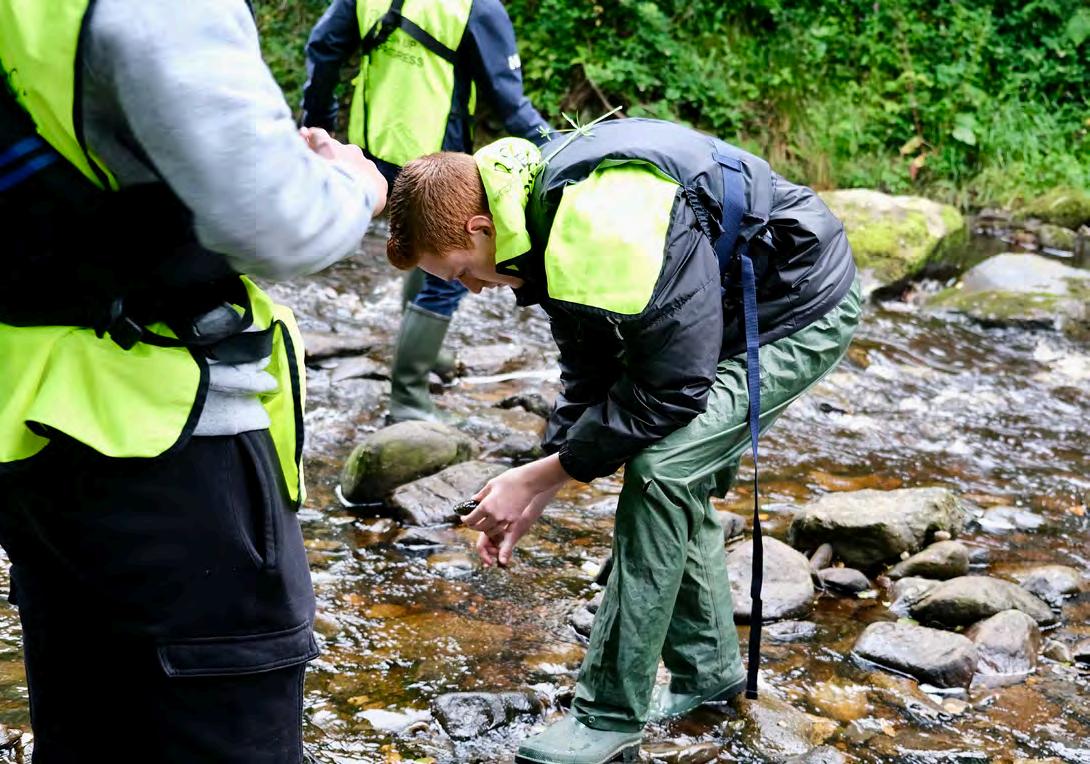
Curriculum Links Table
Programme Theme Northern Ireland Curriculum (KS1–KS3)
Science of Water (Freshwater Invertebrates & Biodiversity)
WAU (Interdependence): Relationships in ecosystems
Science (KS3): Ecosystems, adaptations, food webs
LLW: Environmental responsibility
Science of Salmon (Salmonid Lifecycles & Conservation)
Anatomy of a River (River Processes, Field Studies, Physical Geography)
WAU (Change Over Time): Life cycles, environmental change
Science (KS3): Adaptations, life cycles, food chains
LLW: Connection between environment and health
WAU (Place & Movement): Local rivers, natural change
Geography (KS3): Erosion, deposition, transportation, river features
Mathematics/ICT: Measurement, mapping
Republic of Ireland Curriculum (Primary & Junior Cycle)
Science (Living Things): Habitats, biodiversity, indicator species
SESE/Geography: Environmental awareness
SPHE: Environmental care and empathy
Science (Living Things): Life cycles, food webs, survival
SESE/Geography: Rivers and coastal features
SPHE: Responsibility in conservation
Geography (Natural Environments): Rivers, erosion, landscape change
Science (Materials & Forces): Water movement, fluvial processes
Junior Cycle Geography: Human-environment interaction, fieldwork
Ocean Literacy & Marine Biodiversity (Marine Science & Sustainability)
Science (KS3): Marine ecosystems, food chains, climate impact
WAU: Oceans as part of the global ecosystem
LLW (Citizenship): Sustainability and human impact
Science (Environmental Awareness & Care): Oceans, conservation
Junior Cycle Science: Biodiversity, human impact on oceans
CSPE: Global citizenship and sustainability
